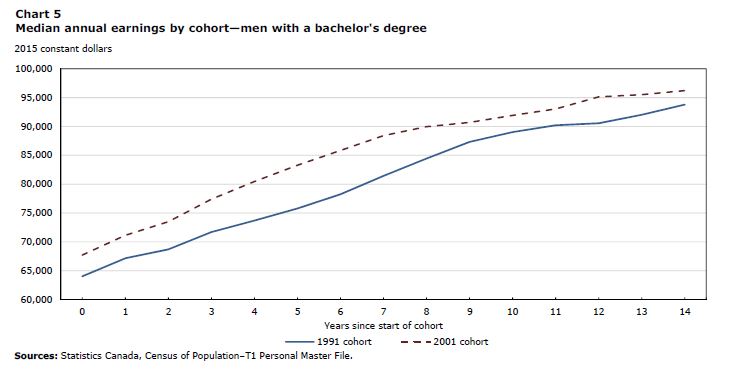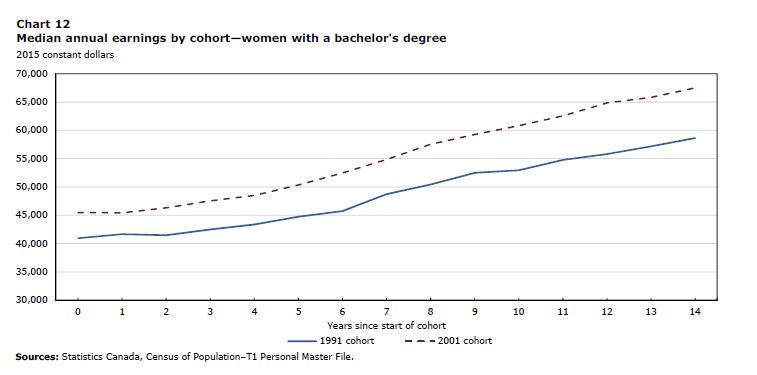The Economics and Statistics Division maintains archives of previous publications for accountability purposes, but makes no updates to keep these documents current with the latest data revisions from Statistics Canada. As a result, information in older documents may not be accurate. Please exercise caution when referring to older documents. For the latest information and historical data, please contact the individual listed to the right.
<--- Return to Archive
For additional information relating to this article, please contact:
January 29, 2019STUDY: ARE THE CAREER PROSPECTS OF POST SECONDARY GRADUATES IMPROVING? Statistics Canada recently released a study comparing the labour market earnings of post secondary graduates. Specifically, the study was the first to compare the long-term labour market outcomes of two cohorts of young postsecondary graduates with linked census and tax data. The two groups of people that were compared were 1)graduates aged 26 to 35 years old in 1991 followed for 14 years (until 40 to 49 years old) and 2) similar aged cohort in 2001 that were followed from 2001 to 2015.
As there has been increasing supply of post-secondary graduates (e.g. the share of 25+ women with a postsecondary credential rose from 46.1% in 1990 to 73.7% in 2016) but also changes in the demand for education in the labour market, the change in earnings for graduates could vary based on sex, level of education and major field of study. The study looks at long-term (15 years) labour market outcomes of the two Canadian postsecondary graduates cohorts during their mid-career, by examining the cumulative median earnings over the period, the time spent with an employer-sponsored pension plan, and the time spent with union membership. Non-workers are included in the sample, so differences between the groups can result from both employment conditions (number that are employed, part-time vs. full-time work) and hourly wages. Earnings have been measured in 2015 constant dollars. The study controls for the differences in the age structure and place of birth between the two cohorts.
Comparing the cumulative median earnings between the 2001 cohort with the 1991 cohort. Among men, those with no education credential (-$6,164) and a high school diploma (+$5,388) saw the smallest change in earnings. A college certificate had an increase of $20,000 for the 2001 cohort, this was below the larger gains for those with trade certificate ($71,000), bachelor's degree ($66,000), masters ($161,000), and doctoral graduates ($210,000). The largest increase for men was in the commerce, management and business administration graduates at the master's degree level ($264,000). There was no substantial decrease by graduates of any field at college or university level.
Median cumulative earnings for the 2001 cohort increased for all education levels for women. The gain for women and men with a trades certificate were similar while women with a bachelor’s degree register a larger gain (+$85,000) than men. At the Master’s degree level, the overall gain were substantially smaller among women ($56,000) compared to men ($161,000). The largest increase in earnings for women was among those with a Bachelor’s degree in Agricultural, biological, nutritional and food sciences ($167,000), followed by fine arts ($139,000) and health professions and related technologies ($123,000).
The 2001 cohort faced lower unemployment rates lower than the 1991 cohort for the first eight years of study as the early 1990s saw an economic recession and jobless recovery afterwards. The 2001 cohort did experience the 2008/2009 recession midway through the study period, so that both cohorts faced a similar labour market during the last seven years. The 2001 cohort outperformed their counterparts from the 1991 cohort in both sub-periods, suggesting that there is a upward trend in the long-term labour market outcomes of postsecondary graduates with the results not being driven by business cycle issues.


Statistics Canada: Study: Are the Career Prospects of Postsecondary Graduates Improving?
<--- Return to Archive